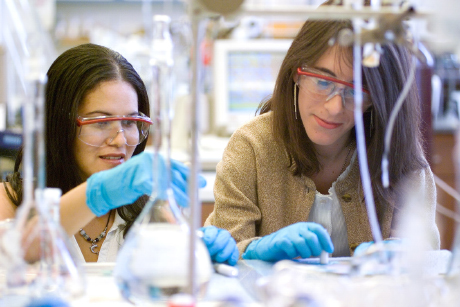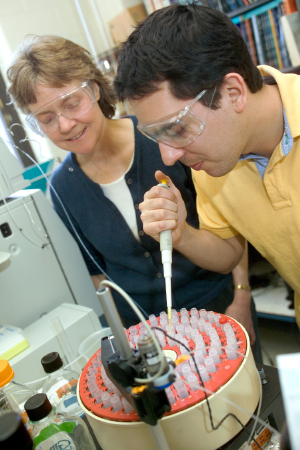New chemistry curriculum adds breadth, depth to studies
By Kathy Hovis

From such courses as Pesticides, Insecticides and the Environment to Philosophy of Science, Cornell’s newest chemistry majors have a wide range of electives they can now choose from to fill out the 60-credit major.
After talking with students and noticing changes in the diversity of careers that chemistry alumni pursue, chemistry faculty in the College of Arts and Sciences decided to change the curriculum to offer more options for their students, two-thirds of whom pursue careers that don’t require a graduate degree in chemistry.
“This is a reflection of a changing world and the increasingly interdisciplinary nature of our work,” said Professor Dave Collum, chair of the Department of Chemistry and Chemical Biology. “We took a brush hog to the major, cutting out some chemistry underbrush and replanting it with some fresh growth from throughout the university.”
During the process, a group of faculty, including associate chair Brian Crane and director of undergraduate studies Roger Loring, pored through course offerings from other departments to develop the list of approved electives that appears on the chemistry website.
“We wanted to offer more flexibility in the chemistry major, which hasn’t been traditionally very flexible,” said Thomas Ruttledge, senior lecturer and director of undergraduate advising. “Now that the changes are in place, our older students are asking ‘Why didn’t you do this earlier?’”
In fact, the department has been offering an “alternative major” for years, Ruttledge and Collum said, but some students were concerned that the alternative major could be perceived as less rigorous than the standard major. However, for students with broad interests, such as those attempting a double major, the rigidity of the standard major created problems. This new curriculum provides flexibility within a single major, accommodating those who choose more elective classes and those who pursue solely traditional chemistry classes, they said.

Many of Cornell’s chemistry majors go on to careers in law, economics or business, Collum said. This new major will prepare them sufficiently in chemistry but also allow them to focus on other areas of interest.
For example, students wanting to study chemical biology can choose electives from the chemical biology courses offered in chemistry, as well as other departments’ courses in biology and biochemistry. Students with an interest in science policy might choose courses from the history, philosophy, and science and technology studies departments to augment their chemistry courses.
The changes also include the department’s decision to accept more advanced placement high school classes toward the major, allowing second-semester freshmen to move on to sophomore-level classes.
The new sequence will free up space in the later years to take graduate classes and delve into research, Ruttledge said. A variety of undergraduate research opportunities exist in the department’s many labs, even for students not pursuing accelerated studies, he added.
Students have also formed a new peer-advising group, Ruttledge said, to offer incoming students guidance as they consider their options in the department.
Kathy Hovis is a writer in the College of Arts and Sciences.
Media Contact
Get Cornell news delivered right to your inbox.
Subscribe